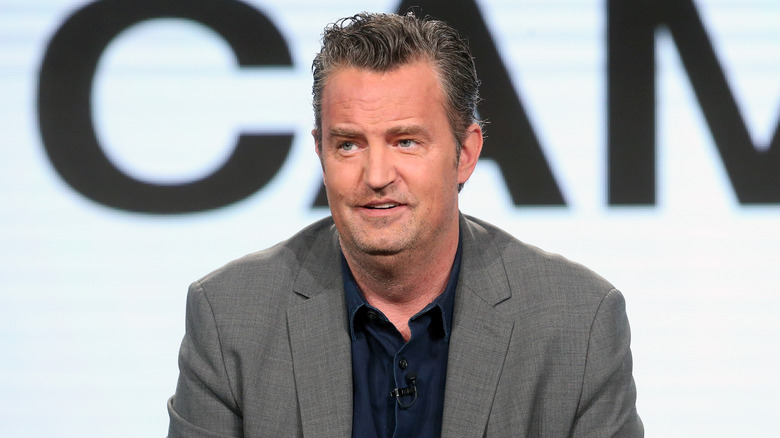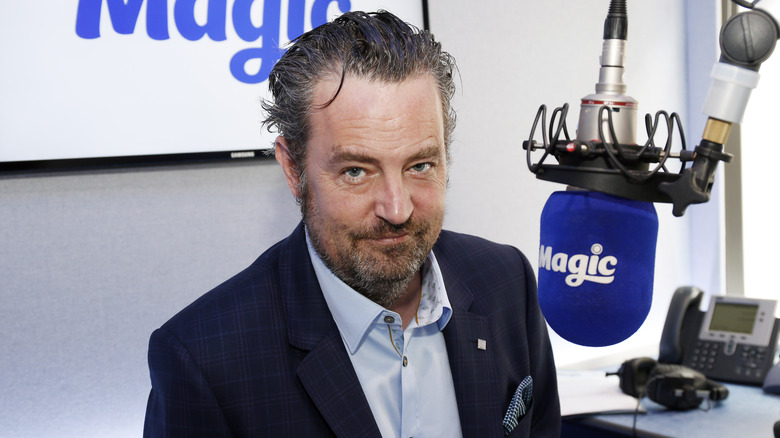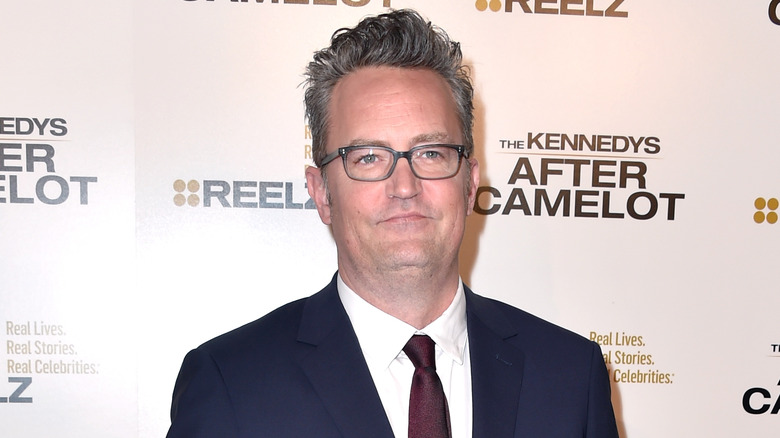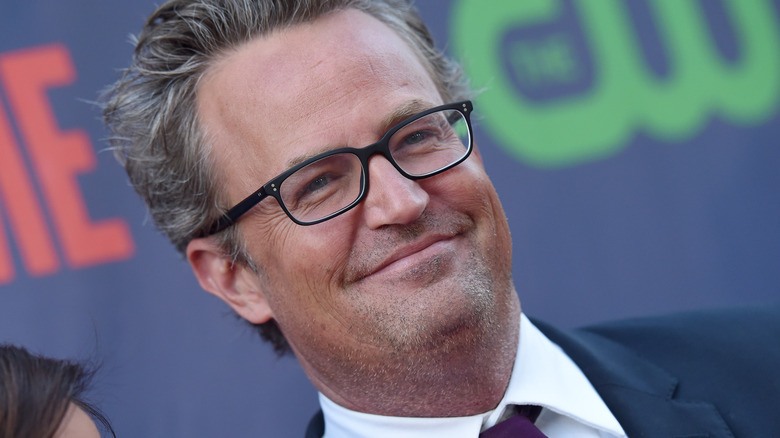5 Revelations From Matthew Perry's Memoir That Are Even More Tragic Now
Note: This article discusses addiction issues.
In the wake of Matthew Perry's untimely passing, his memoir "Friends, Lovers, and the Big Terrible Thing" quickly soared to the top of Amazon's best-sellers list. This rapid ascent stands as a testament to his profound impact and deep connection with fans all over the world as they sought to delve into the book's pages to gain a more intimate understanding of the actor they loved.
The "Friends" star primarily wrote his memoir as a way to unravel his tumultuous journey to sobriety after grappling with addiction for most of his life. "It came pouring out of me — the painful stuff, hospitals, rehabs, all of this stuff — it poured out of me," he told The Los Angeles Times. But while he mostly detailed his struggles, he found the writing process cathartic. "It all flew out of me," he shared with People. "It wasn't that difficult a book to write. It's a more difficult thing to read, because you go, 'Wow, this is a horrible story.' But there's a sense of humor that runs through it."
The book unfolds a collection of painful revelations, making it particularly challenging to digest in the wake of his death. From being in a weeks-long coma to spending a staggering amount of money in pursuit of sobriety, here are some of the biggest surprises in Perry's memoir:
Matthew Perry had multiple brushes with death
Matthew Perry's substance abuse led to several hospitalizations and multiple brushes with death. It came to a head in 2018 when his colon burst as a result of an over-reliance on opioids and his family was told that he may not make it out alive. The "17 Again" star slipped into a coma, and only the support of an ECMO machine sustained his survival. His recovery took months, during which he had to use a colostomy bag and undergo several follow-up surgeries.
"I had been on opiates, and off opiates, and back on different opiates for so long that I suffered from a situation that only a subset of the population gets," Perry wrote. "Opiates cause constipation. It's kind of poetic. I was so full of s*** it almost killed me."
Speaking with People, Perry admitted that coming out of that near-death experience prompted a thorough self-reflection and had him questioning if he even deserved to survive. It also led him to make a renewed commitment to turning his life around. "That's the time I really came close to my life ending. I was put on an ECMO machine, which does all the breathing for your heart and your lungs. Every doctor says it's a 'Hail Mary'," he said. "No one survives that. So the big question is why? Why was I the one that survived? There has to be some kind of reason."
Perry spent millions trying to get sober
Matthew Perry's road to sobriety demanded a substantial investment of resources, both on the personal and financial front — especially on the financial front. In addition to multiple stints in treatment facilities, he revealed that he poured millions of dollars into his efforts to recover.
"I have spent upward of $7 million trying to get sober," he penned. "I have been to six thousand AA meetings. (Not an exaggeration, more an educated guess.) I've been to rehab fifteen times. I've been in a mental institution, gone to therapy twice a week for 30 years, been to death's door." He adjusted the figure in an interview with The New York Times, noting that his total expenditure may have been closer to $9 million.
At one point during one of his stays in rehab, he reached a point of overwhelming frustration that he had to subject himself to intense physical pain because he felt like he was at a dead end. "I'll never be able to fully explain what happened next, but all of a sudden, I started slamming my head against the wall, as hard as humanly possible," he detailed. "There was blood everywhere," he wrote. And when confronted on the reason why he did it, he simply said: "Because I couldn't think of anything better to do."
His 'Friends' co-stars helped save his life
According to Matthew Perry, he probably would have let his addiction kill him early on if it weren't for his "Friends" gig, along with his co-stars who went to lengths just to look after his well-being. Describing the sitcom as a "good and fun job," it was both his form of escape and motivation to keep trying. "It is not out of the realms of possibility that I may have ended up on the streets of downtown LA shooting heroin in my arm until my untimely death," he wrote. "I was the second baseman for the New York Yankees. I couldn't f*** that up. I would never forgive myself. When you're earning $1 million a week, you can't afford to have the seventeenth drink."
Despite his attempts to conceal "the big terrible thing" that was his addiction, Jennifer Aniston, along with the rest of the cast members, eventually caught on to his struggles and offered their support. "I know you're drinking,'" he recalled of the time Aniston reached out to him. "To be confronted by Jennifer Aniston was devastating. And I was confused. 'How can you tell?' I said. I never worked drunk. 'I've been trying to hide it.' We can smell it,' she said, in a kind of weird but loving way, and the plural 'we' hit me like a sledgehammer."
Perry missed out on a big onscreen comeback because of his addiction
Following "Friends," Matthew Perry engaged in diverse projects with varying degrees of success, yet none managed to surpass the iconic status of Chandler Bing, the role with which he became synonymous. He hoped to make a big comeback when he was cast to star in Adam McKay's "Don't Look Up," which he claimed was the "biggest movie I'd gotten ever." Unfortunately, he had to withdraw from the lineup because of yet another near-death experience.
In his memoir, Perry shared that he was enrolled in a luxury rehab center in Switzerland at the time of filming but found difficulty shying away from pain medication. He confessed to feigning stomach pains for access to hydrocodone, only for it to backfire later during surgery when he was given propofol. The anesthetic apparently had an adverse reaction to hydrocodone and caused his heart to stop. "It wasn't a heart attack — I didn't flatline — but nothing had been beating," he recalled. "I was told that some beefy Swiss guy really didn't want the guy from 'Friends' dying on his table and did CPR on me for the full five minutes, beating and pounding my chest."
The toll on Perry's body was significant, resulting in eight broken ribs. It led him to make the "heartbreaking" decision to stop filming the movie as he was in far "too much pain" to go on, he said.
Matthew Perry's recovery made him want to help others
Looking back on everything he's been through, Matthew Perry realized that the universe must have conspired to guide him to overcome all those hurdles so he could help others with similar struggles. And so he committed to leveraging his experiences to assist those with addiction issues.
"I am no saint — none of us are — but once you have been at death's door and you don't die, you would think you would be bathed in relief and gratitude," he wrote. "But that isn't it at all — instead, you look at the difficult road ahead of you to get better and you are pissed. Something else happens, too. You are plagued by this nagging question: Why have I been spared?'"
During his press tour for the book, Perry hoped that his legacy would extend beyond his portrayal of Chandler Bing. "I would like to be remembered as somebody who lived well, loved well, was a seeker. And his paramount thing is that he wants to help people," he shared on the "Q With Tom Power" podcast. "The best thing about me, bar none, is that if somebody comes to me and says, 'I can't stop drinking, can you help me?' I can say 'yes' and follow up and do it," he added. "When I die, I don't want 'Friends' to be the first thing that's mentioned. I want that to be the first thing that's mentioned. And I'm gonna live the rest of my life proving that."
If you or anyone you know needs help with addiction issues, help is available. Visit the Substance Abuse and Mental Health Services Administration website or contact SAMHSA's National Helpline at 1-800-662-HELP (4357).






